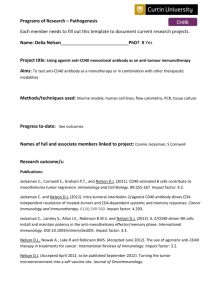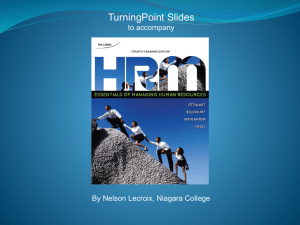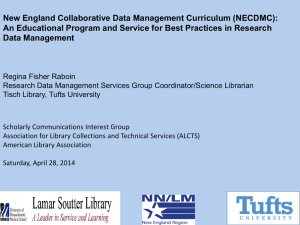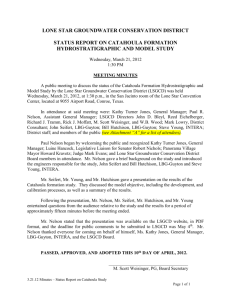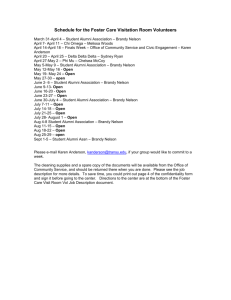interviewed by Sarah R. Jimenez - The Talloires Network
advertisement
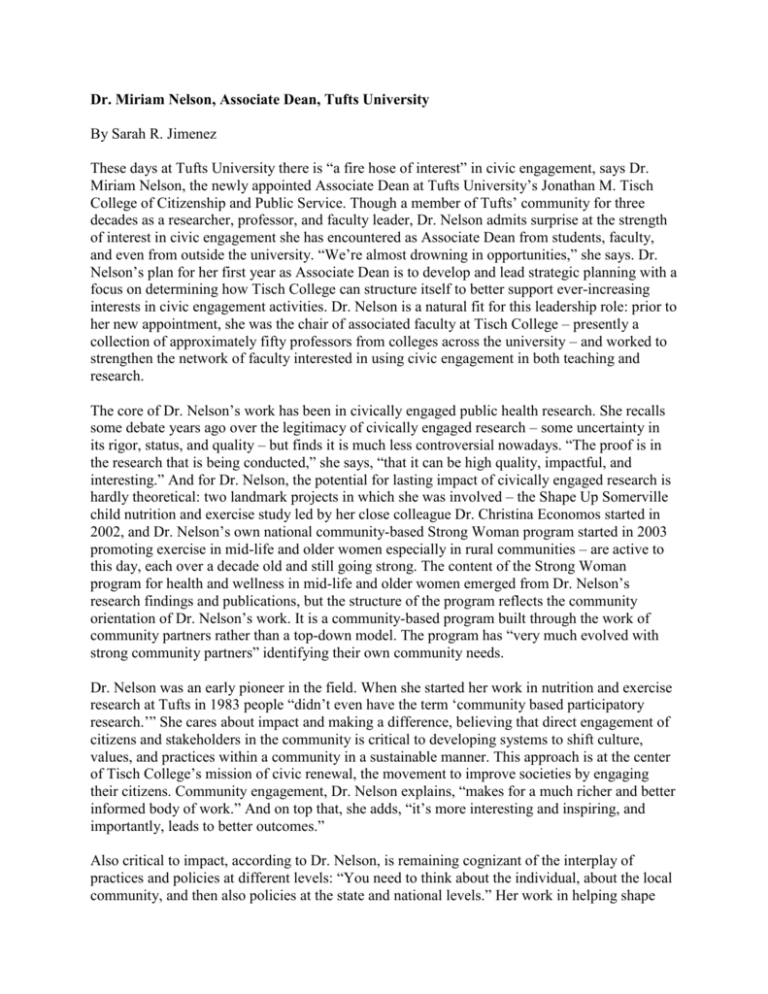
Dr. Miriam Nelson, Associate Dean, Tufts University By Sarah R. Jimenez These days at Tufts University there is “a fire hose of interest” in civic engagement, says Dr. Miriam Nelson, the newly appointed Associate Dean at Tufts University’s Jonathan M. Tisch College of Citizenship and Public Service. Though a member of Tufts’ community for three decades as a researcher, professor, and faculty leader, Dr. Nelson admits surprise at the strength of interest in civic engagement she has encountered as Associate Dean from students, faculty, and even from outside the university. “We’re almost drowning in opportunities,” she says. Dr. Nelson’s plan for her first year as Associate Dean is to develop and lead strategic planning with a focus on determining how Tisch College can structure itself to better support ever-increasing interests in civic engagement activities. Dr. Nelson is a natural fit for this leadership role: prior to her new appointment, she was the chair of associated faculty at Tisch College – presently a collection of approximately fifty professors from colleges across the university – and worked to strengthen the network of faculty interested in using civic engagement in both teaching and research. The core of Dr. Nelson’s work has been in civically engaged public health research. She recalls some debate years ago over the legitimacy of civically engaged research – some uncertainty in its rigor, status, and quality – but finds it is much less controversial nowadays. “The proof is in the research that is being conducted,” she says, “that it can be high quality, impactful, and interesting.” And for Dr. Nelson, the potential for lasting impact of civically engaged research is hardly theoretical: two landmark projects in which she was involved – the Shape Up Somerville child nutrition and exercise study led by her close colleague Dr. Christina Economos started in 2002, and Dr. Nelson’s own national community-based Strong Woman program started in 2003 promoting exercise in mid-life and older women especially in rural communities – are active to this day, each over a decade old and still going strong. The content of the Strong Woman program for health and wellness in mid-life and older women emerged from Dr. Nelson’s research findings and publications, but the structure of the program reflects the community orientation of Dr. Nelson’s work. It is a community-based program built through the work of community partners rather than a top-down model. The program has “very much evolved with strong community partners” identifying their own community needs. Dr. Nelson was an early pioneer in the field. When she started her work in nutrition and exercise research at Tufts in 1983 people “didn’t even have the term ‘community based participatory research.’” She cares about impact and making a difference, believing that direct engagement of citizens and stakeholders in the community is critical to developing systems to shift culture, values, and practices within a community in a sustainable manner. This approach is at the center of Tisch College’s mission of civic renewal, the movement to improve societies by engaging their citizens. Community engagement, Dr. Nelson explains, “makes for a much richer and better informed body of work.” And on top that, she adds, “it’s more interesting and inspiring, and importantly, leads to better outcomes.” Also critical to impact, according to Dr. Nelson, is remaining cognizant of the interplay of practices and policies at different levels: “You need to think about the individual, about the local community, and then also policies at the state and national levels.” Her work in helping shape nutrition and exercise policy at the community level has been complemented by extensive opportunities to shape policy at the national level, including serving as a panel member on the 2010 and 2015 Dietary Guidelines for Americans. “I feel I’ve been able to infuse some forward thinking into this fairly rigid guidelines work, thinking about the larger context of the food environment and physical activity environment.” Dr. Nelson was also the 2007-2008 vice chair of the Physical Activity Guidelines Advisory Committee for the US Department of Health and Human Services, which released a report that was used to develop the inaugural Physical Activity Guidelines for Americans. Though Dr. Nelson recalls fondly how her work benefitted from the direct collegial support from other Tisch Faculty Fellows, staff, and leaders, the first priority of Tisch College has always been to increase and improve civic engagement education for students. Where Dr. Nelson had previously worked more closely with faculty and, appointed at the Friedman School and the School of Medicine, with graduate and professional students, stepping into a greater leadership role at Tisch means she has greatly increased contact with undergraduate students. She says, “undergraduates are really fascinating, filled with such potential and interest and excitement.” One of the challenges she hopes to support at Tisch College in the coming years is the problem of political apathy. Across the nation, university leaders have perceived that civic engagement among students doesn’t automatically inspire political engagement. In fact, some believe it allows, in effect, students to bypass participation in the political world. A national leader in civic education, Tisch College’s unique model and engaged research are setting the standard for higher education’s role in civic renewal. Serving every student at Tufts University, Tisch Colleges prepares young people for a lifetime of civic engagement and creates an enduring culture of active citizenship. The strength of this approach, Dr. Nelson says, is that each school and each faculty or student participant will take a slightly different approach to civic engagement, feeling out ways of engaging the community that are creative and tailored to each field of study. While this approach fosters ingenuity, it also makes difficult the process of finding “common metrics” to evaluate Tisch College’s overall impact. And Dr. Nelson is very clear on the kind of impact she will be looking for. Communities with high levels of citizen engagement in civic and democratic institutions are “more prosperous, more equitable, and… better places to live, learn, work, and play.” The “big goal” of Tisch College as Dr. Nelson sees it, and what her energy will now be channeled toward, is “to make sure that every student that comes out of Tufts has the values, skills, and knowledge to be lifelong active citizens because that will be good for their career but it will also be good for their community, the nation, and the world.” Dr. Nelson has worked with Tisch College for over a decade. As Associate Dean, she leads Tisch College’s community engagement, student programming, and communications efforts. She also leads the process of refining Tisch College’s strategic vision by engaging a variety of stakeholders, including faculty, students, staff, community partners, and the Board of Advisors. A prolific and best-selling author, Dr. Nelson’s research on physical activity, nutrition, and obesity prevention has contributed broadly to public policy and has attracted extensive extramural funding. She holds primary academic appointment at the Friedman School of Nutrition Science and Policy with a secondary appointment at the School of Medicine. Dr. Nelson holds a BS from University of Vermont and a Ph.D. in Nutrition from Tufts University.

